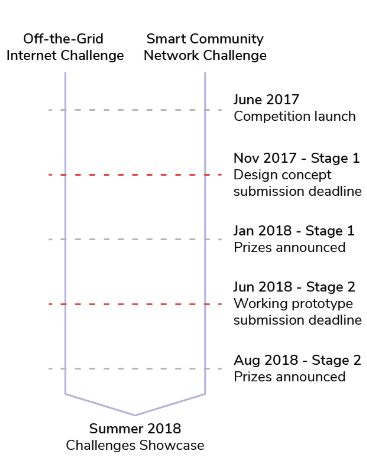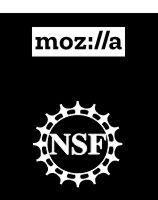| $2 Million To Reinvent The Internet |
| Written by Sue Gee | |||
| Monday, 26 June 2017 | |||
|
This US-only contest comes from Mozilla and the National Science Foundation who have joined forces to call for big ideas that will keep the web accessible, decentralized and resilient. There are two challenges each with two phases, for design concept and working prototype, each with multiple cash prizes. In its announcement of a total of $2 Million prizes for: wireless solutions that get people online after disasters, or that connect communities lacking reliable Internet access Mozilla reiterates its well-known position that the Internet is a global public resource that must be open and accessible. The explanation of why it, together with the NSF, is offering $2 Million in prize money is that the Internet is vital to promote equality, well being, and the general good, pointing out: In the 21st century, a lack of Internet access is far more than an inconvenience — it’s a staggering disadvantage. Without access, individuals miss out on substantial economic and educational opportunities, government services and the ability to communicate with friends, family and peers. Quoting the 2016 Broadband Progress Report from the Federal Communication Commission, Mozilla continues: Currently, 34 million people in the U.S. — 10% of the country’s population — lack access to high-quality Internet connectivity. This number jumps to 39% in rural communities and 41% on Tribal lands. And when disasters strike, millions more can lose vital connectivity right when it’s needed most. The two stages of the challenge are: Off-the-Grid Internet Challenge When disasters like earthquakes and hurricanes strike, communications networks are among the first pieces of critical infrastructure to overload or fail. How can we leverage both the Internet’s decentralized design and current wireless technology to keep people connected to each other — and vital messaging and mapping services — in the aftermath of a disaster? In this challenge Mozilla/NSF are looking for projects that are portable, easy to power and simple to access. As an example it suggests a backpack containing a hard drive computer, battery and Wi-Fi router. Smart Community Networks Challenge Many communities across the U.S. lack reliable Internet access. Sometimes commercial providers don’t supply affordable access; sometimes a particular community is too isolated; sometimes the speed and quality of access is too slow. How can we leverage existing infrastructure — physical or network — to provide high-quality wireless connectivity to communities in need? In this challenge Mozilla/NSF are looking for projects that have far-reaching range and robust bandwidth, while making a minimal physical footprint and uphold users’ privacy and security. As an example it suggests a neighborhood wireless network where the nodes are housed in, and draw power from, disused phone booths or similarly underutilized infrastructure. The two challenges are running concurrently in a two-stage process which has the following timeline: Submissions for the design concept phase are invited from individuals and teams, nonprofits and for-profits. Applicants must be US citizens or permanent residents or, in the case of organizations incorporated and having a primary place of business in the US. Team leaders must be at least 18. Participants between 13 and 17 are can be team members if they have written permission from their parent or legal guardian. Would-be entrants must first complete an Intent to Apply form, indicating which of the two challenges (or both) they are interested in before October 15. The deadline for submissions, which might be mockups, diagrams and written documentation, for the Design Concept Stage is November 15. Submissions will be evaluated by a panel of judges, who will be looking for technical feasibility, affordability, scalability, social impact and differentiation (i.e. how the proposed solution differs from or improves on existing solutions). They will select projects to progress to the next stage (to be announced in January 2018) and award the following prizes:
Submissions to the Working Prototype Stage should provide proof of the working prototype’s capabilities which might include Submissions to the Working Prototype Stage should provide proof of the working prototype’s capabilities and might include: Network test data; Video demos; Photographic documentation; Software code and Hardware schematics. The deadline is June 22 and the prizes, to be announced in August 2018, will be as follows:
Winners of the Working Prototype Stage (Stage 2) will be expected to share their submissions - including general explanations of how their submissions work and advance the field - at a closing Challenges showcase in Summer 2018. All entrants are strongly encouraged to host their documentation publicly and to openly license their solutions (via GitHub or equivalent) to enable others to learn and benefit from their projects.
More InformationWireless Innovation for a Networked Society (WINS) Challenges Related ArticlesMozilla Looks Into Health of Internet Mozilla Funding - Crisis Averted For Now
To be informed about new articles on I Programmer, sign up for our weekly newsletter, subscribe to the RSS feed and follow us on Twitter, Facebook or Linkedin.
Comments
or email your comment to: comments@i-programmer.info
|
|||
| Last Updated ( Monday, 26 June 2017 ) |




